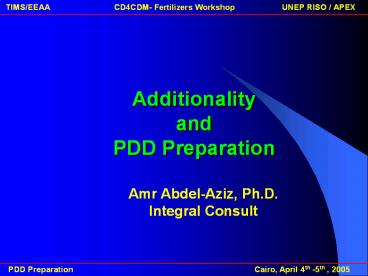Additionality and PDD Preparation - PowerPoint PPT Presentation
1 / 24
Title:
Additionality and PDD Preparation
Description:
Additionality and PDD Preparation Amr Abdel-Aziz, Ph.D. Integral Consult Additionality Additionality Additionality Example N2O Abatement Additionality PDD ... – PowerPoint PPT presentation
Number of Views:238
Avg rating:3.0/5.0
Title: Additionality and PDD Preparation
1
Additionality and PDD Preparation
- Amr Abdel-Aziz, Ph.D.
- Integral Consult
2
Additionality
3
Additionality
Definition
- Emission reductions that are additional to any
that would occur in the absence of the CDM
project
CDM
Importance
- Most critical issue for project acceptance
- Project will be refused if additionality is not
proven
4
Additionality
In Easier Terms
Barriers
- No Enforceable regulations that mandates the
implementation of the project
5
Example N2O Abatement
Project will not be implemented
Project will not be implemented
Barrier High Investment for Project
Barrier High Investment for Project
- Enforceable regulations mandates reduction of N2O
- No regulations to mandate reduction of N2O
Project will be implemented
Project will not be implemented
Not Additional
Additional
6
Additionality
How to Demonstrate
- Flow chart of series of questions that lead to
narrowing down of potential options - Qualitative or quantitative assessment of
different potential options and an indication of
why the non project activity is more likely - Qualitative or quantitative assessment of one or
more barriers facing proposed project - An indication that the project type is not common
practice in the proposed area of implementation
7
PDD Preparation
8
CDM Project Cycle
- First step in the CDM project cycle
9
Who Prepares a PDD ?
- Responsibility of project participant
- Usually, project participant hires a consultant
to prepare the PDD - Project participant should avail funds for PDD
preparation - Can be funded through special arrangements (CD
Projects, seller and buyer agreement, etc.)
10
Why Prepare a PDD ?
- Validation is done based on a PDD
- One of the requirements to be registered as a CDM
project - Registration is a step done prior to
verification and certification - i.e. can not have a CDM project and consequently
certified emission reductions (CERs) without a PDD
11
PDD Cost ?
- Approximately 40,000 to 50,000
- Baseline 20,000 to 30,000
- Monitoring Plan 10,000 to 20,000
- Cost can be reduced by
- Development of Standardized baseline
- National Experts
- Previous experience of existing PDDs
12
PDD Preparation Process
- Prepare Project Identification Note (PIN) prior
to Proceeding with PDD - Preliminary approval of Designated National
Authority (DNA) - Prepare PDD
- Assign DOE for validation
- Submission of PDD to DNA to obtain official
approval for project (voluntarily participation
assists in achieving SD)
13
Registration Process
- Prior to registration, DOE shall make the PDD
available for public comments for 30 days
(parties, stakeholders, UN-FCCC accredited NGO) - Registration requires the following
- PDD
- DNA written approval
- Explanation of how DOE has taken into account
public comments - Registration of project should be completed in 8
weeks, unless there is a request for review
14
PDD Format
- PDD format available on UNFCCC CDM website
- Must prepare PDD according to format
- PDD Format available in 6 official languages of
UN - Working language of the board is English ? Must
submit in english - 7 Sections and 4 Annexes
15
PDD Format
- A. General Description of Project Activity
- B. Baseline Methodology
- C. Duration of Project Activity / Crediting
Period
16
PDD Format
- D. Monitoring Methodology and Plan
- E. Calculation of GHG Emissions by Sources
- F. Environmental Impacts
- G. Stakeholder Comments
17
PDD Format
Annex 1 Contact Info on Project Participants
Annex 2 Info Regarding Public
Funding Annex 3 Baseline Information Annex
4 Monitoring Plan
18
Proposing a new Methodology
- Have to submit draft PDD new baseline
methodology new monitoring methodology - Takes approximately 4 months to get approved by
Meth panel and EB - Public comments are invited for 15 days
- Better use existing approved methodology to
reduce time
19
Small Scale Projects - Criteria
- Renewable energy project activities with a
maximum output capacity equivalent of up to - 15 MW
- Energy efficiency improvement project activities
which reduce energy consumption, on the supply
and/or demand side, by up to the equivalent of - 15 GWh per year
- Other project activities that both reduce
anthropogenic emissions by sources and directly
emit less than - 15 ktCO2eq annually
20
Small Scale Projects - Requirements
- Reduced requirements for PDD preparation
- Simplified baseline methodologies by project
category - Simplified Monitoring methodologies by project
category - Less cost in preparation
- Same DOE may undertake validation and
verification
21
Small Scale Projects - Format
22
Bundling and Debundling
- Bundling
- Combining a number of small scale projects in one
PDD to reduce transaction costs - Projects may be bundled as long as the total size
is below limits for single project - Debundling a large project to benefit from small
scale simplified procedures is not allowed
23
Useful Resources and Tools
- Approved methodologies on UNFCCC CDM website
- PDDs under review on UNFCCC CDM website
- IPCC guidelines for emission estimation
- PDD guidelines
- CDM guidebook
24
Recommendations
- Do not underestimate the difficulty of preparing
a PDD - Use conservative assumptions
- Be transparent and truthful
- A good PDD increases the chances of accepting a
project - Process entails several check points (Stakeholder
comments, validation, Public comments, may be a
request for review)































